Rabbi's Blog
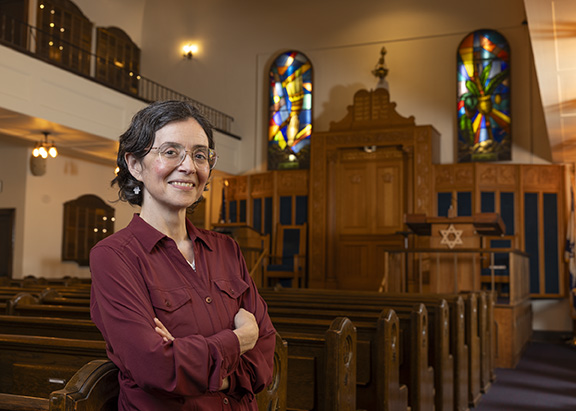
Miketz – Chanukah day 6 – Rosh Chodesh – Chag HaBanot / Eid El Bana’at
Summary of the Torah portion Miketz – we read about the rise of Yosef and the economic re-structuring of Egypt, transforming the Egyptian people in serfs to Pharaoh. The portion ends in the middle of the confrontation between Yosef and his brothers, when the brothers come for the second time, bringing Benjamin with them.
Today is Chanukah, the sixth day, and it is also Rosh Chodesh. Those are the famous holidays. You might not know but the Jewish communities in Tunisia, along with the communities of Libya, Algeria, Kushta, Morocco and Thessaloniki, celebrated in the Middle Ages another holiday today, called chag haBanot in Hebrew, or Eid El Bana’at in Judeo-Arabic. In English we would call it Holiday of the Women or Women’s Day.
The celebrations varied according to each community, but the theme is the same: connections.
Women would celebrate their connections with each other and their connection with Judaism, God and the Torah. In Israel nowadays, where an effort is happening to rediscover and strengthen that holiday among other holidyas brought by the Diaspora to Israel, researchers of the group HaLuz HaYivri asked questions to those who celebrated the Hag HaBanot in their communities – click here for more. We hear of women going to the synagogue to kiss or touch the Torah, and saying various blessings. Women would get together and cook a meal which they would then celebrate with singing and dancing without the presence of men; mothers would give their daughters gifts and bridegrooms would give gifts to their brides; women or girls who had fallen out with each other would reconcile their differences and pledge friendship to each other. All of these were among the traditions celebrated in the North African communities.
Now, one of the questions that you might have is why precisely today, which is the day that connects Chanukah and a Rosh Chodesh, should be the day for that particular celebration. The fact is that the Maccabees are just one of the stories of Chanukah. There are three other stories that populate Chanukah, each with a woman in the center, each reflecting a different aspect of Jewish tradition and women’s lives.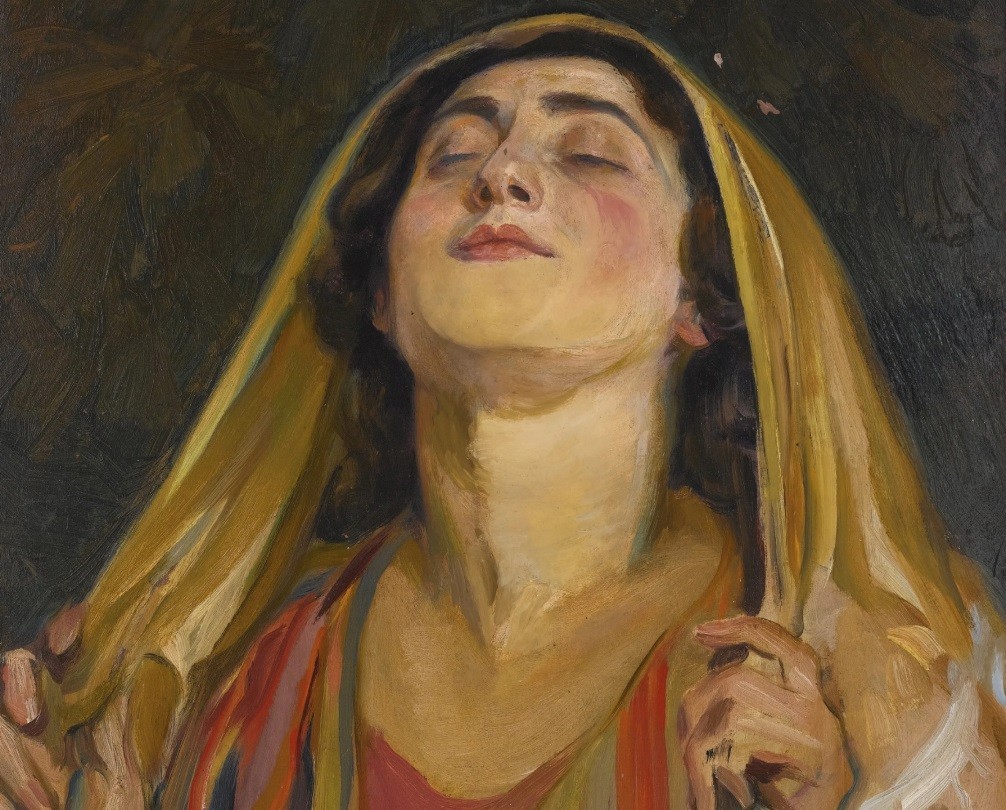
For centuries, the best known was the narrative of Hannah and her seven sons, which, like the Maccabee saga, appears in the Apocrypha (works not included in the canon of the Hebrew Bible). Hers is a familiar story in Jewish history, one of suffering and martyrdom, and she plays the familiar woman’s role of a strong and pious mother. In this case her strength and piety are put to the ultimate test as the cruel Antiochus, Seleucid king of Syria, tries to force each of her sons to eat pork. As each refuses, he is tortured and murdered while his mother looks on. The king urges Hannah to persuade her remaining youngest son to save his life by eating the pork. Instead, she encourages him to follow his brothers’ example and martyr himself. Torn by grief, with her sons gone, she dies also. Hannah’s commitment to Jewish law under the direst circumstances encouraged generations of Jews in many lands as they faced pogroms and persecutions. Her story is in the seventh chapter of the Book of Maccabees, and you can read it by clicking here.
A very different Hannah takes center stage in a second Chanukah story, generally told in books of legends such as Otzar Midrashim. This is a young Hannah, sister of the Maccabees, and about to be married. Determined to prevent the local Syrian ruler from exercising his “droit de seigneur,” the right to have sexual relations with a new bride, she strips naked before the guests at her wedding feast. When her brothers threaten to kill her because of her shameful behavior, she demands that they save the honor of all Jewish women by fighting the Syrians. As the tale goes, her action sparks their rebellion.
Then there is the story of Judith. In this narrative, Holofernes, an Assyrian general, sets out to conquer Judea, but is stopped by the people of Bethulia (possibly Jerusalem). He besieges the city, and, worn down by hunger and thirst, the elders decide to surrender. Enter Judith. The beautiful widow berates the leaders for their lack of faith and devises her own plan. Taking her maid and a sack of food to eat (she observes Jewish dietary laws), she talks her way into Holofernes’ camp. There she convinces the general that she deserted her people, and by praying to God she can bring him victory. For three days, she leaves in the nighttime to pray, and returns in the morning, thus accustoming the guards to her coming and going. On the fourth day, Holofernes gives a banquet in her honor. Overcome by lust and planning to seduce her, he dismisses his servants, then drinks himself into a stupor. Judith grabs his sword and with all her might hacks off his head. She and her maid leave, this time with Holofernes’ head in their sack. After discovering his headless body, the Assyrian army flees in 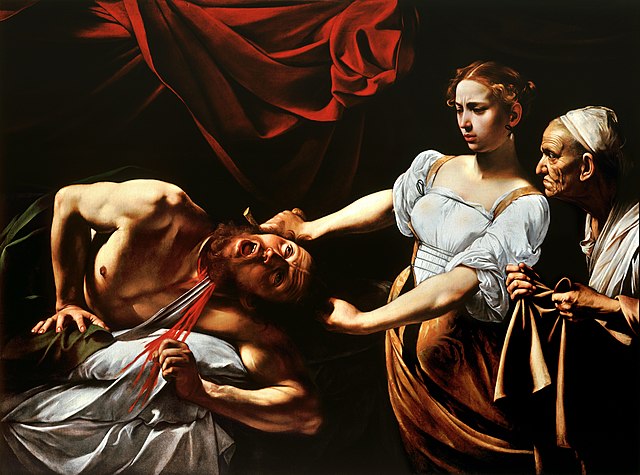 disarray, and the Jews win a great victory, “by a woman’s hand.”
disarray, and the Jews win a great victory, “by a woman’s hand.”
So it makes sense that this Woman’s Day would be celebrated precisely when these two moments of the calendat appear, Rosh Chodesh – which is celebrated by women – and Chanukah.
In recent years there have been some attempts made to renew and to strengthen Chag HaBanot, as a push to have a traditional framework for the idea of equality between men and women, which is a part of Israeli consciousness but that has been chipped away by the Rabbanut, with the Sephardi Chief Rabbi in 2019 forbidding women to light Chanukah candles at the Kotel, even in the women’s side of it, and some groups opposing women appearing in photos of newspapers or ads. Groups like the Shalom Hartman Institute have been highlighting this tendency in the past few years. But knowing and celebrating these other holidays is also a way of highlighting the diversity and richness of our people and our traditions, reminding us that we are, at the center, one people with many different facets.
As we continue lighting the candles for Chanukah, may we focus on moving towards a richer and more egalitarian Judaism in our lives.
Shabbat Shalom.
Vayeshev and Chanukah 2022
Summary: We begin the cycle of Yosef, and this cycle takes over the rest of the book of Genesis.
Yaakov settles (vayeshev) with all his family and is clear about his preference for Yosef. Yosef has dreams of greatness, his brothers are envious and plot to kill him, but end up selling him into slavery. The brothers dip Yosef’s special coat in the blood of a goat and show it to their father, leading him to believe that his most beloved son was devoured by a wild beast.Yosef is taken to Egypt and sold to Potiphar and ends up thrown into prison when he refuses to commit adultery with Potifar’s wife. In prison, Yosef meets Pharaoh’s chief butler and chief baker, both incarcerated for offending their royal master. Both have disturbing dreams, which Yosef interprets; in three days, he tells them, the butler will be released and the baker hanged. Yosef asks the butler to intercede on his behalf with Pharaoh. Yosef’s interpretations of the dreams are fulfilled, but the butler forgets all about him and does nothing for him.
==
Chanukah and the story of Yosef are always together, because of the vagaries of the Jewish calendar. In our reading, Yosef has two important dreams, the sheaves and the stars, that correspond to the two dreams of Pharaoh, with cows and ears of grain. But looking at how the Torah describes the four dreams, there is a marked distinction: Pharaoh is drescribed as awakening from the dream, but not Yosef. And so, commentaries abound, some affirming that Yosef was daydreaming and some saying that he was having a prophetic vision. Hold on to that thought.
Now, one of the big questions regarding chanukah is why we celebrate it for 8 days. If the Maccabees found a jug with enough oil to last for one day and the oil lasted for extra seven days, the miracle itself was seven days long. Why then is Chanukah celebrated for eight days?
One answer that is given (by R’ David Halevi z”l, the “Taz”) is that miracles always involve making something-out-of-something (“yesh mee’yesh”), not something-out-of-nothing. For example, we read in II Kings (chapter 4) that the prophet Elisha did a miracle with oil: he made a small amount of oil to fill dozens of jugs in order to save the children of a widow from slavery. She was so poor that the only thing she had was a bit of oil, and so he could cause the oil to “multiply” miraculously.
Similarly, writes the Taz, in order for the oil to “multiply” and last for eight days, there had to be a drop left at the end of the first day. And that is why the mircle in his view is eight days, because there was a bit left, and so the miracle did happen in the first day as well – the miracle of a little bit, of a tad extra. Like hope – there is always a bit left, even in the darkest of moments.
Now look at this picture. By now it’s an iconic picture, and many people have seen it. Yad Vashem distributed it in the internet. It was taken by a woman, Rachel Posner, in a city called Kiel, in Germany, on 1931.
It was an erev Shabbat, the final, eighth day of Chanukah; so the chanukyiah filled with all eight candles and before sundown. It’s framed by the window of an apartment. Just across the way, in the apartment building facing it, unfurled from another window, is the Nazi flag. The two symbols are having a silent conversation. This photo is from 1931; the Nazis hand not yet risen to power, but the threat was acutely felt by the woman, Rachel Posner, who snapped the shot. Her husband, Rabbi Dr. Akiva Posner, was the rabbi of the small town of Kiel.
In looping German script, Rachel Posner writes in the back of the photo: “Chanukah, 5692. ‘Judea dies,’ thus says the banner. ‘Judea will live forever,’ thus respond the lights.”
And so even though it looks like Rachel Posner is dreaming with our people continuing, I want to wager that at times it did not feel like that. Just as Yosef in the pit, or in the prison, was left wondering about his future and hoping beyond hope, so too many Jews after 1933 were left wondering if our people would actually make out of this. But, says the tradition, Yosef was a prophet – and maybe those dreams, dreamed so long ago, gave him hope. Where does Rachel Posner’s hope comes from? I don’t know, but I could guess is an unshakable faith in the Jewish people itself, in our strength, in our resilience.
And today, we too need to answer the question: How do we go on? How do we transmit Judaism to the next generation? What is the power of our Jewish rituals and continuity?
Today we take the Jewish traditions of Torah study, Shabbat and circumcision for granted, but in the context the Maccabees were living in, it was not so. Had they not fought and rebelled, and lived through this miracle, Judaism could have been lost forever.
Our challenges are different than the Maccabees and the Holocaust. But our hope and faith in the Jewish people is the same. And it is up to each of us to light the chanukyiah and find a new mitzvah, a new form to bring light into this world, and do our part – just as the Maccabess did, and just as Rachel Posner did.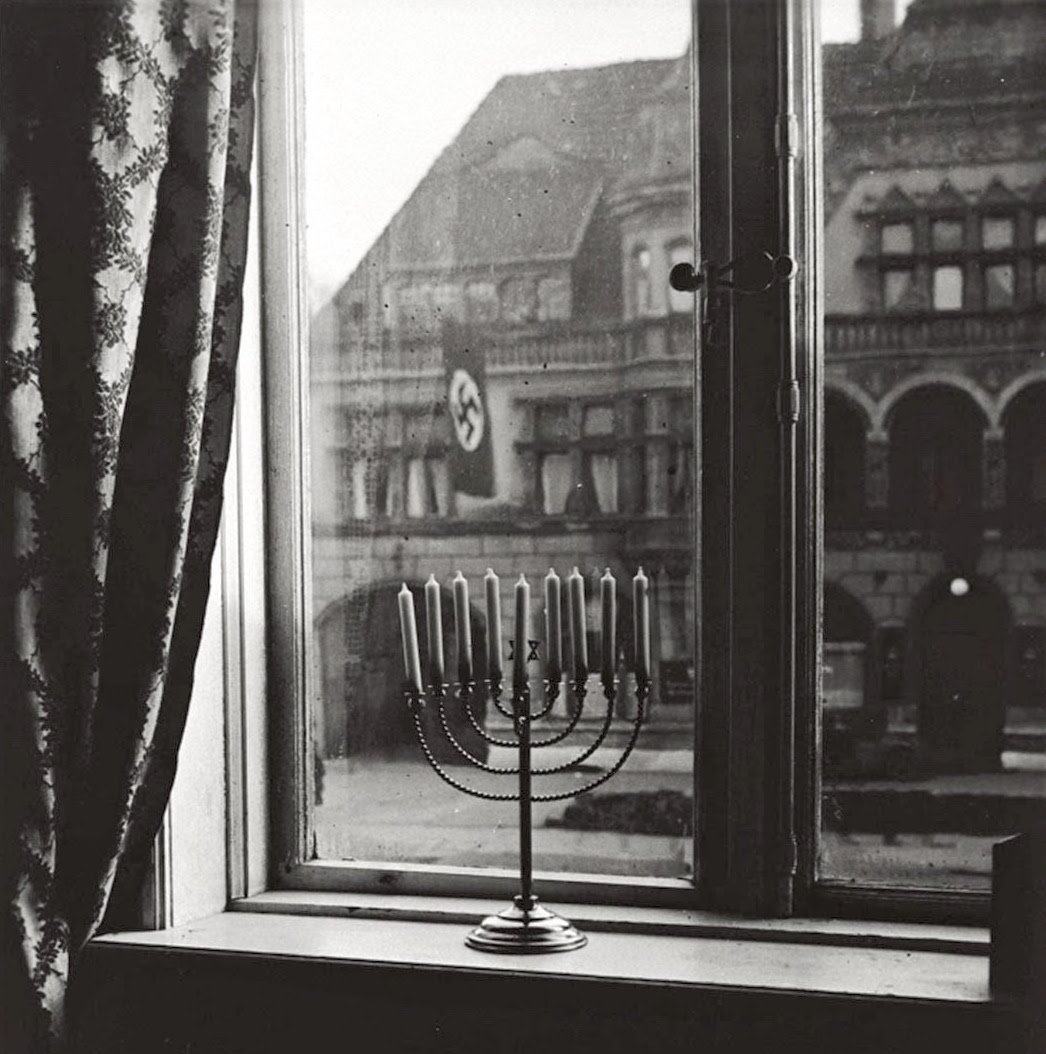
And here is a picture of the back of the photo. And a picture of the family as they left Germany in 1933 for Eretz Israel.
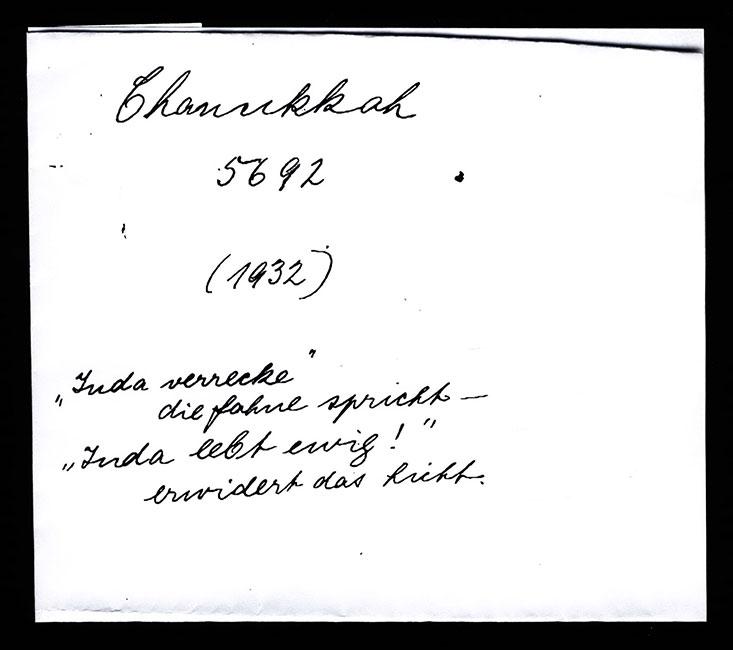
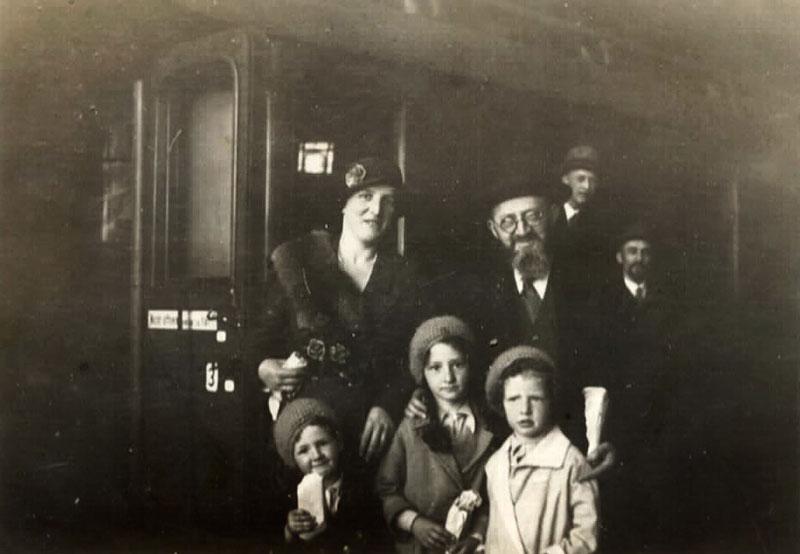
Vayishlach ~ Preparations
Vayishlach proposes an interesting change in our ancestor Yaakov (Jacob).
Yaakov has a name that is not really a honorable one. In the two moments when the name is explained to us, readers, the text first points out the need to supplant his brother, clinging to his brother’s heel, and then to the stealing of blessings, as Esav points out that Yaakov actually means yakiv, one who swindles, cheats or sneaks.
We, despite being descendants of Yaakov, call ourselves by the name children of Israel, the name that Yaakov receives in our portion Vayishlach. Yaakov will actually receive this name twice, once by the angel with whom he struggles during the night by the dried riverbed of the river Yavok, and another time when God Godself, using the name E=lohim, will again change Yaakov’s name. But the new name does not stick at all with the first name change proposed by the angel. The text consistently calls him Ya’akov after this. Yisra’el, we are informed, is the one who struggles with humans and God and wins. Ya’akov, the one who cheats.
If we read the entire saga of Yaakov, looking for moments when Yaakov encounters God, we will see that there is a 21 year hiatus – all the time that Yaakov is in Lavan’s house, Yaakov does not mention God at all, using any name. It is as if that wondrous dream of the ladder is put in the backburner, and forgotten. As Yaakov leaves Lavan’s house, stealthy, because he really believes that Lavan won’t let him go, God, using the name Ad-nai, talks to Yaakov, telling him to go back to his father’s house. As Yaakov has his first name change, and then meets Esav and makes peace, Yaakov is still being called Yaakov, God is still being called E-lohim by Yaakov, and things seem to be in a stand still. But then something quite interesting happens: after the whole ordeal with his brother Esav, the text says that God tells Ya’akov to go build an altar.
Ya’akov, from his own initiative, tells everyone in his family that they have to “Rid yourselves of the alien gods in your midst, purify yourselves, and change your clothes. Then we will arise and go to up to Beit El, and I shall make an altar there to the God who answered me on the day of my distress and was with me on the way that I went.”
Ya’akov is preparing to encounter God directly through sacrifice, and at that time sacrifices are what we today would call prayer.
This preparation is essential, at the end: because this is when God Godself will change the name of Ya’akov. The place will also be changed by receiving a new name, since now there is an altar giving a sacred status to that place.
Even though the change in the place is clear, the change in Ya’akov will not be as complete. Yaakov will toggle between the two polar opposites: Ya’akov and Yisra’el. The text will then proceed to show Ya’akov being called by those two names – when Ya’akov is taking charge of the future of the Jewish people, he will be called Yis’rael, otherwise, he will be called Ya’akov.
Yisrael, then is a name connected to expanded consciousness, our higher selves, the version of us that looks in the long run and is able to both ask for forgiveness and forgive, the version of us that shares love freely and is capable of receiving expressions of love. In the end, we want to fulfill Ya’akov’s prayer to God after the dream with the stairs reaching up to heaven: Ad-nai will be our God. So we say every day, twice, the Shemah – Ad-nai Eloheinu, Ad-nai Echad; and in the end of Yom Kippur, Ad-nai hu haE-lohim.
And when we, today, approach prayer, approach this moment of possibly encountering God, we too need to prepare ourselves and be open to the encounter. Rabbi Micki Rosen, z”l, had a saying on the walls of Yakar, the shul I attended when I was in Jerusalem: you can pray in a barn, but can you pray in a barn? The second “you” was underlined. Coming to a space dedicated to prayer is essential to be ready to pray. Our tradition will see choosing what to wear as significant – every time a person changes clothes in the Tanach, in the Bible, that person is either meeting a king or talking to God.
On one level, clothes are an expression of respect. Just as one would not show up to meet a king in rags, one also does not stand before God in prayer in tatters. And yet, in the discussion about what to wear, the halachic decisors will indicate that the clothes do not have to be anything special – they should be clean and presentable. Prayer, as something shared by all, cannot become a fashion show.
What are we to make of all of this once we face realities such as Zoom, and join minyans through our computer? In some sense, we should prepare ourselves as well, and our space. It is challenging to see our living rooms as sacred space, but if we make a conscious effort of preparing the space, it too can become a place for God. If we make a conscious choice regarding clothes, and join the minyan in something other than PJs or sweatpants, we are expressing our readiness to make this experience the best it can be – an encounter with God, an encounter with community and an encounter with the best part of ourselves.
Shabbat Shalom
Ki Tetze – four mitzvot for these days
Summary: Ki Tetze continues the second speech of Moshe. According to the Sefer Hachinuch Ki Tetze contains 74 mitzvot, more than any other parashah, which is 12% of all of the 613 mitzvot in the Torah. Maimonides discounts two mitzvot from that total, and gives us 72. Still a very high percentage.
==
~ Why do we have all these mitzvot at the end of the Torah?
~ How does having all these mitzvot being given disputes the name Deuteronomy, which literally means “the repetition of the law”?
==
As we are approaching Rosh Hashanah I wanted us to notice that in the prayers of RH and YK we ask God to give us life. We will add: Remember us for life, King who wants life, and write us in the book of life, for your sake, Living God.
In Ki Tetze the idea of doing something and have long days appears twice. “והארכת ימים, “and you shall live long days” shows up regarding the mitzvah of removing the mother bird before taking the eggs in Devarim 22. And also למען יאריכו ימיך, “so that you shall live long days” appears regarding having just weights and measures in Devarim 25. Now if you count similar sentences such as למען יאריכון ימיך, and לא תאריכון ימים עליה, so that your days will be long and your days will not be long on the land, you find that this idea appears ten times in the Torah.
On six of those times, the text tells us that if you observe all of God’s mitzvot, you will live long lives. For example, in Devarim chapter 32 (v. 46-47): “And he [=Moses] said to them: pay attention to all the things… which you shall command to your children, to be careful to do all the words of this Torah… and in this, you will live long days on the land, which you are crossing the Jordan to inherit.”
Therefore, we could simply leave thinking that if you observe all the mitzvot, you will live a long life! But that is not realistic, is it? First because it is impossible for one person to observe all the 613 mitzvot – there is no category of individual to whom all the mitzvot apply. All the more so nowadays, when the temple is not standing – of the 248 positive commands, only 126 are currently applicable. And of the 365 negative commands, only 243 are still applicable. The total nowadays is 369 mitzvot.
Even among these 369 mitzvot, however, there are many that most of us will never do since they depend on circumstances. One example is not being tardy to fulfill your vow – only if you make a vow it would applies. Another is building a parapet around the roof of your house – you need to build a house with a flat roof and then have a parapet[1].
But there are four specific mitzvot that the Torah attaches the idea of a long life. Two are found in our parsha. In order of appearance:
The first is honoring one’s parents, as we read in Exodus 20:11 and Deuteronomy 5:16:“Honor your father and your mother so that you should live long days on the land which the Lord your God is giving you.”
The second one is tza’ar ba’alei hayyim, “having mercy on living creatures,” which we find in this week’s parashah (Deut. 22:6-7): “If you happen to come upon a bird’s nest… you shall not take the mother with the fledglings. You shall send away the mother, and then you can take the fledglings so that it should be good for you, and you shall live many days.”
Number 3, is honesty in business, as epitomized by eifat tzedek, accurate weights and measures, as we also read in this week’s parashah (Deut. 25:15): “You must have complete and just weights and measures, so that you should live long days on the land which Adnai your God is giving you.”
Finally, in next week’s portion we read a general instruction: do not engage in idol worship (Devarim 30:17-18) “And if you bow down to those other gods and worship them… you shall not live long days on the land which you are crossing the Jordan to inherit.”
Now, I want to stress that this is not necessarily a promise to the individual. In fact, according to the story in the Talmud, Kiddushin 39b, believing that there is a direct individual connection between observing mitzvot and a long life is what made Elisha Ben Abuya a heretic. The Talmud reinforces this by saying that the long-life promise has to do with the world to come.
Rationalist rabbis nowadays, who do not want us to do mitzvot because of such promises, note that most of those promises are written in the plural “you”. This is pointed out by Avraham Ibn Ezra (Spain, 12th century) in his commentary on the our verse about accurate weights and measures. He says: “For it is well-known: for every just kingdom shall stand, for Tzedek [righteousness] is like a building, and if it’s twisted it’s like destruction — in a moment, the wall will fall.” So rationalist rabbis point out that each individual has the responsibility for the collective. If the collective Jewish people, believes in God, honors parents, deals with money with integrity and honesty, and cares for animals then our collective shall live long days.
Another way to understand this idea, and our request of being written “in the book of Life” is challenging the assumption that long days is a measure of time, or that life means being alive in a body. Doing mitzvot is not supposed to be because you want, as a friend of mine puts it, pie in the sky when you die. You shouldn’t do mitzvot because there is a potential gain with God. You should do them because they are the right thing to do, or as another voice in the midrash says: mitzvot were given to refine us – to make us better people. Abraham Joshua Heschel will say the same: mitzvot are to make us more noble, to discipline and inspire. The book of Life then becomes the book of good life, of a life worth living – and that is above and beyond the actual number of days we have on the planet.
So we can focus on those 4 mitzvot for the next three weeks: honoring parents, being careful with suffering of animals, dealing our finances with integrity and being mindful that there is only one force behind all of existence – God. That is how we have a life worth living, a life that has a long reach in the future.
[1] So, if you look closely to the number of mitzvot, both negative and positive, that we are supposed to keep, that applies to all of us, the number boils down to 270, 48 being positive and 222 being negative.
Ekev ~ the beasts in our field
Ekev Triennial 10:12-15 – 11:22-25
The parashah tells of the blessings of obedience to God, the dangers of forgetting God, and directions for taking the Land of Israel. Moses recalls the making and re-making of the Tablets of Stone, the incident of the Golden Calf, Aaron’s death, the Levites’ duties, and exhortations to serve God. Ekev has 7 mitzvot, 4 of them in our triennial reading.
==
Interspersed in our reading today are mitzvot regarding how to act. What does God require of us, according to the text? What does that mean, in your opinion? Is there a charge to imitate God’s ways?
What are the promises for “good behavior”? What are the threats for “bad behavior”?
==
And it will be, because you will heed these ordinances and keep them and perform, that the Lord, your God, will keep for you the covenant and the kindness that He swore to your forefathers (Devarim 7:12).
In the opening verse of this week’s reading, we encounter a simple paradigm – if we live up to the word of God, God will deliver on the promises He made to the Patriarchs and we will conquer and then stay in the land. The portion as a whole has that simple idea – particularly the paragraph we add to the Shema, which is Devarim 11:11-21. However, things are not as simple as that, even within the text: “And the Lord, your God, will drive out those nations from before you, little by little. You will not be able to destroy them quickly, lest the beasts of the field outnumber you (7:22).”
In the simple meaning, the battle for Canaan will not be quick. The concern appears to be that if we conquer more land than we can settle, wild animals will overrun these conquered areas. This is odd. Moshe has just told the people that there is going to be Divine protection and intervention and now we are worried about the beasts of the field? Can’t God keep animals at bay?
One explanation is that the animals here are not four legged creatures. The Modzitzer Rebbe (Rav Shaul Yedidyah Elazar of Modzitz) explains that it has to do with our own instincts. When forced to fight, a person must draw on their baser instincts. When forced to kill, a person gives up and loses some part of their tzelem elokim, their image of God, because they had to snuff out someone else’s humanity. Life sometimes does call for this type of action. The soldier must kill; the soldier must be prepared to take the life of another human being if this is what the mission calls for. But there is a harsh reality that must be acknowledged. There is collateral damage on a personal level: after taking a life – the soldier is no longer the same. Once those feelings and instincts that allowed one to kill have been unleashed, it is not easy to simply bottle them up. This, explains the Modzitzer Rebbe, is the meaning of the verse.
God has to drive the enemies out little by little lest the beasts that dwell within a person take over. If a person engages in constant fighting the animal within eventually overwhelms the person and can extinguish your humanity. I think this is easy to see in social media – particularly if you engage in the fights we see. People tend to forget not only that there are other people on the other side of the screen, but they allow themselves to become consumed by the high of spewing harsh words and anger.
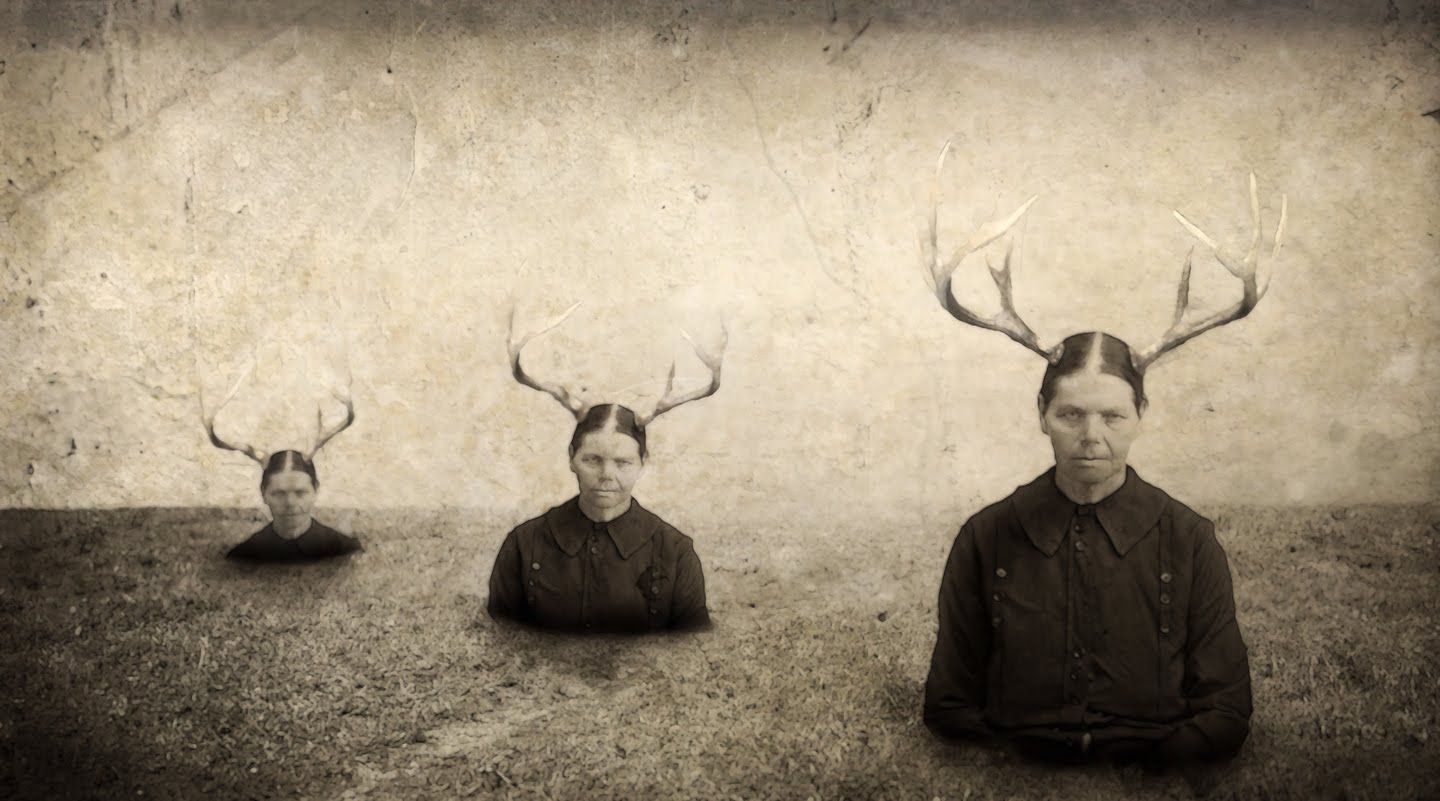
The Torah then teaches us a valuable lesson by following this idea with all the other things God expect us to do – which is to take care of the most vulnerable members of society. And we know that the orphan, the widow, the stranger, the poor will never stop showing up in human societies. So we need to constantly be helping them as a form of living up to the actions of God Godself, who befriends the stranger – and so we are to do that as well.
What we do with consistency determines who we become. The actions we engage in shape our character and our essence. If we want to become good and holy people, we must engage in good and holy acts. Yet, at times we engage in certain activities that we know are detrimental to our body or soul, but we convince ourselves that this action will not determine who we are.
But the text reminds us pen tirbeh alecha chayat hasadeh, if I consistently act like the animal, the inner animal will eventually dominate and eclipse the holiness I possess within. There are times when we must unleash the animal within, but we must have a plan how to rein it in, assess the damage, and create a space in which to repair and heal.
Our reading teaches us a fundamental lesson. We become what we do consistently. Our actions reinforce and solidify our identity.
May we make the right decisions and choices, and when we fail, let us find the courage to rein in the beasts of the field.
==
Picture credit // and an amazing poem about this very issue: https://thedishwasherstears.wordpress.com/2010/04/25/beasts-of-the-field/
I am a slow learner.
Or maybe I don’t learn at all.
*
It depends on who you ask.
*
It is easier to destroy a thing than to nurture it.
In a rit of felous jage.
Shabbat Hazon – destruction and renewal
Devarim
Triennial: 2:31-3:22 // Ishaiahu 1:1-27 // Shabbat Hazon
==
There is a special name for this Shabbat, which is Shabbat Hazon, the Shabbat of the vision. The vision is the vision of our haftarah, the first vision of the book of Isaiah, of the destruction of Jerusalem, remembered on the 9th of Av, when we fast and commemorate the destruction of the temple both times and a few other calamities that befell our people, such as the First Crusade, the expulsions from England, France, and Spain, the beginning of WWI, the beginning of the deportation of the Warsaw ghetto, and the AMIA bombing in Buenos Aires – all of those happened on or around the 9th of Av.
Tomorrow night we will read the Book of Lamentations, or Megillat Eicha. That reading only happens at night, differently of what we do in Purim, when we read the Megillah of Esther both at night and in the morning.
Now the Book of Lamentations begins with the word Eicha, which is translated as “how”. The book really opens with a rhetorical question: How is it that the city, full of people, sits alone and abandoned? That same word, Eicha, appears in our reading of Devarim, at the beginning of the second alyiah in the full reading. There, Moshe asks “Eicha”, How can I bear alone your bickering, and the burden of you?” That same question, Eicha, will appear in our haftarah: Isaiah asks – Eicha – how has she become unfaithful, the city that once was filled with justice?
It is interesting to notice that our portion of Devarim, always read before the 9th of Av, always accompanied by the words of Isaiah, has only two mitzvot – to appoint judges who actually know the law, and not showing partiality in judgment.
Now, among the causes of why Jerusalem was destroyed the rabbis bring the idea that judgment in Jerusalem was deprived of compassion. In Baba Metzia 30b one of the many causes of destruction is that judgment was done sticking to the letter of the law – and never seeing the full picture. So the centrality of proper judgment, a judgment that must take in consideration the spirit of the law, cannot be overstated. Another of the causes is baseless hatred – the archetype of that idea is the famous story of Kamtza and Bar Kamtza.
Rabbi Alan Lew, z”l, brings forth a great idea. He ties the journey of the High Holidays to the 9th of Av. There are seven weeks between the 9th of Av and Rosh Hashanah. On RH we celebrate the birth of the world and the renewal of all things. Now for renewal to happen, the old must be torn down – and that is symbolized, in our personal journey, by the 9th of Av. So the shaking of the old structures, their crumbling, the letting go of whatever is not useful or good anymore begins happening now. This is the beginning of the journey, that will close in Sukkot when we create new structures – symbolized by the sukkah. On Simchat Torah, in 10 weeks from now, we will read Genesis again, and God is going to ask the First Human an essential question: Ayeka, where are you?
The Hebrew letters of the word Ayeka are the same of Eicha. The tradition is inviting us, beckoning us, to embrace the crumbling of the structures, to mourn those structures and to renew ourselves. The guiding principles of that renewal are letting go of hatred and embracing compassion. It is then, at the end of our journey, that we will be able to find an answer to this question – where are you, Ayeka, that begins today, with the question Eicha, how.
How did we get here? What are the ego traps that brought us here? What are the causes of the crumbling of the old structures, and why don’t they serve their purposes anymore? It is only with the radical embracing of what is that we can move forward and create what can be.
May this Shabbat mark the real beginning of our journey towards renewal, justice and compassion. Shabbat Shalom.
Behaalotcha – a person and a candle
Behaalotcha
Behaalotcha opens with Aaron being commanded to raise light in the lamps of the menorah, and the tribe of Levi is initiated into the service in the Sanctuary.
A “Second Passover” is instituted in response to the petition “Why should we be deprived?” by a group of Jews who were unable to bring the Passover offering in its appointed time because they were ritually impure. God instructs Moses on the procedures for Israel’s journeys and encampments in the desert, and the people journey in formation from Mount Sinai, where they had been camped for nearly a year.
The people are dissatisfied with their “bread from heaven” (the manna), and demand that Moses supply them with meat. Moses appoints 70 elders, to whom he imparts of his spirit, to assist him in the burden of governing the people. Miriam speaks negatively of Moses, and is punished with leprosy; Moses prays for her healing, and the entire community waits seven days for her recovery.
==
The second verse of our portion is “Speak to Aharon and say to him: When you raise updraw up: Others, “kindle.” the lights,
toward the fronttoward the front: More specifically, toward the area in front. of the menora let the seven lights give light.”
The word for light, and the word for candle, in Hebrew, is the same NER. We are familiar with this word from the blessing of shabbes candles and the blessings for chanukah – lehadlik NER.
The menora in the Mishkan, and later in the Temple, did not have a conventional candle like we have today, but oil and wick. The conventional candle is parafin or wax and a wick. Any light, to be considered a NER, is really a wick and a source of fuel.
Now the word NER gets used in interesting ways in the Tanach. “Ki ner mitzvah and Torah ohr”: The mitzvah is a candle or a lamp; and Torah is light; it says in Proverbs. And also “Ner Ad-nai nishmat adam”: The lamp of Ad-nai is a person’s soul.
A human being is comprised of a body and at least three levels in their soul, according to our tradition: Nefesh, Ruach and Neshamah. Ruach is a word usually translated as spirit, Nefesh and Neshamah in English are usually translated in the same word, soul. But for the Hebrew those are two different aspects. Nefesh is the living being, it is in a sense something that we share with all living things – some say it is your passions and strong emotions. The part called Neshamah is the more specific “you”: you as your higher self, you as the specific dream that God has for this world, you at your best and most actualized potential. Now, Nefesh and Ruach, as words, begin with nun and reish, and as an acronym they form the word NER. So a human being is a candle, say our sages.
Now an interesting question is: when is a candle really a candle? Is it at its existence, when you join a source 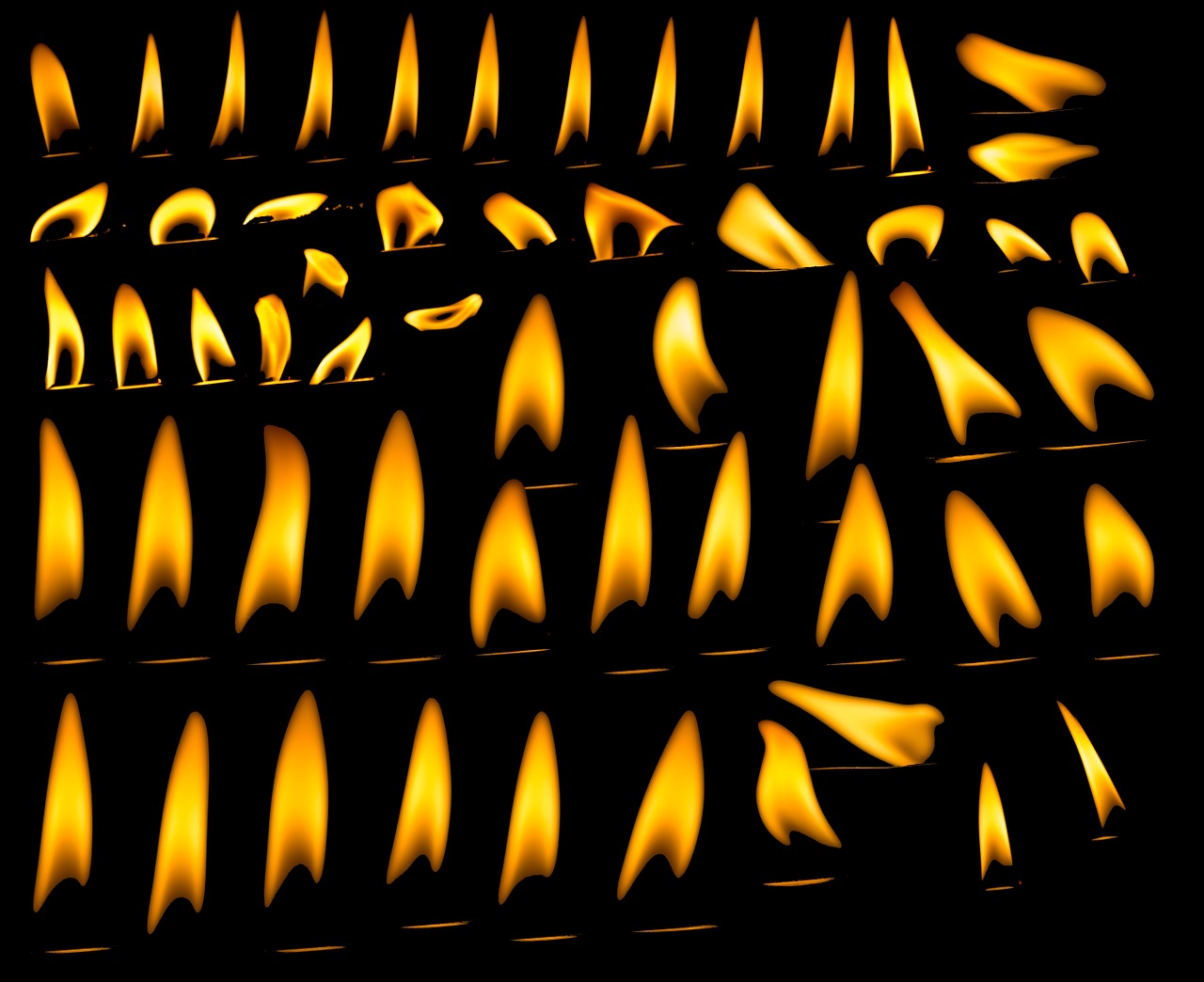 of fuel with a wick, or is it when it is lit? How you answer that question is how you see human beings.
of fuel with a wick, or is it when it is lit? How you answer that question is how you see human beings.
A person is a person – all of us are endowed with a basic dignity. That is the wick and the wax. But a person can only become what they are supposed to become in this world if their neshamah, their essence is lit. The same way, a regular candle exists while it is not lit, but its purpose is to be be lit eventually, and to drive away darkness.
Another favorite sentence with the image of the candle is “Lo yichbe balayla nerah” – her lamp does not go out at night. Some of us sing that on Friday night at home. And what is that lamp? That is the light we get from Torah, that even in difficult and tragic moments in our lives, it does not go out.
So once a soul is lit with Torah, then that soul can find its way in this world, and fufill the reason for which that soul is in this world. The world sometimes seems incredibly dark – but the ignited soul shines its presence and illuminates the world.
The day you were born is the day God decided the world could not continue existing without you in it – because God has an incredible faith in you, and in each of us, that we will bring light and warmth to God’s creation.
May it be so, this week and every week.
Shabbat Shalom.
Terumah ~ the Shechinah, us and the Torah
We are embarking, for this and the next week, on what is called “the Shechinah unit”. That spans this week’s portion, Terumah, and the next, Tetzaveh. Both of those portions have the first description of the Mishkan, the Tabernacle, and the unit begins and ends with “they will make Me a mishkan, and I will dwell among them.” So this exercise of constructing the Mishkan is to have God’s presence, the Shechinah, being felt among the Jews. And please notice that the text does not say that God will dwell in the Mishkan, but rather that God will dwell among the people of Israel.
Terumah means offering, and our portion opens with vayikechu li terumah – and they will take for Me an offering. Now, the word vayikechu, they will take, has a root that connects with something we sing the end of the Torah service: Ki lekach tov natati lachem, torati al ta-azovu. This is just before “etz chayim hi”. Lekach, connected to vayikechu, means portion. I gave you a good portion, the text says, do not abandon My Torah.
That is an important connection for most of the hasidic rebbes. Because, of course, how do we, modern Jews, talk about the Mishkan, the Tabernacle? How do we make these many verses something significant? And this connection is not a connection only made by the hasidic masters, but some midrashim will make that connection as well. There is something that the writers of the midrash and the hasidic rebbes both share, and we share with them, which is a Judaism without a Temple. If the Tabernacle and later the Temple were a way of bringing down God’s Shechinah into the world, how do we do it now, without a physical space?
We do that through studying Torah, the lekach tov, the good portion. And the Sefat Emet, whose real name is Yehudah Aryeh Leib Alter, the rebbe of Gur, will begin by reminding us that lekach also means acquisition. And he says: look how different Torah is from other acquisitions. When we exchange something, and I produce beans and you cloth, I give you beans and you give me cloth, we exchange and both win and lose. We get what we want, but we lose what we produced. Torah is different. When I know a piece of Torah, and you know a piece, and we share, we both continue with what we have, and we both gain.
And here lies another fundamental way of looking to the world and to people: every one of us has a specific Torah to teach and to learn in this world. We are not an accident. Not a single one of us is. Just as we are individuals, so is our specific Torah. And yet, says the Sefat Emet, Torah is what joins all of the Jewish people together. When I learn and when I teach, and when you teach and when you learn, we become one people. That is how we find peace, according to the Sefat Emet. Peace is actively learning with one another, with an open heart, looking at one another’s words, thoughts and actions and learning Torah through them. Peace, shalom, is also seen as one of God’s names.
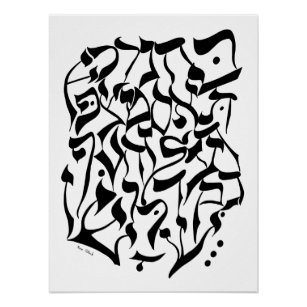
You know that God in the Jewish tradition has many names. One of them is peace. And peace, for the Sefat Emet, is not attained if you are in your corner, and I am in my corner, and we know we disagree and we are both silent. That is something more like a stalemate, or a truce, but it is not peace. Peace – and God’s presence – can only come if we join together to learn. If we are open to be challenged and changed by that encounter. It is when we see each encounter not as a zero-sum game, not as a win-lose, but as a win-win. We both are challenged and changed and grow.
This process of learning Torah, with both a capital and a lowercase letter, is what brings us together as a people. That is the bringing of God’s presence in the world. It is when we internalize both that we are valued, that we have our Torah, and that others have value, and so does their Torah. And we go one step further, which is learning from one another. There are, the Sefat Emet reminds us, seventy faces of the Torah. And if we read closely the list of the people that came to Egypt, we read that they were shiv’im nefesh, usually translated as “seventy souls”, but that translation washes over the obvious Hebrew problem: the text actually says “soul”, in the singular. We are supposed to be, in our individuality, still a people together, still one soul. We only become a people when we embrace all the faces of Torah.
Ki lekach tov natati lachem – I gave you all a good portion. Take an offering for Me – each person, according to their ability, desire, and Torah that they came to learn and teach in this world. That is how we bring down the Shechinah, God’s presence, a task that is now both simpler and more complex in a world without a Temple. Shabbat Shalom.
Yitro: use your voice
Yitro is one of the three portions named after a non-Jew – the other two being Noach and Balak. Yitro, differently from the other two, even according to the Torah text, joins the Jewish people. This portion is famous because it is the one where the Ten Sayings appear, the Aseret hadibrot.
This is the first thing that needs to be clear to us: The Jewish tradition never calls these the Ten Commandments. Never. The Torah text calls them Aseret hadevarim, variouosly translated as “the ten sayings”, “the ten utterances” or “the ten statements”. They are different from mitzvot. Most mitzvot will have a punishment attached to them, and many of the ones we read in the Torah are conditional laws, the structure being “when this happens… then”, often called “case law”. We will see a lot of those in next week’s portion.
The Aseret hadibrot are unconditional laws, a basic frame of reference, do this or don’t do this, the value of the law being self-evident, particularly in the negative ones. This style of law, unconditional, is found only in the Torah and not in any of the other law codes of the Ancient Near East. That is why they are called Aseret hadibrot, the ten sayings.
That is the basic background. However, it is striking to notice that not just these sayings are given at Sinai, but the whole thing is accompanied by an spectacle. There’s thunder, lightning, shofar blasts – it is so overwhelming that the people go back and stand away.
Kol shofar – translated as the blare of the horn – can also be translated as the voice of the shofar. And voice is really central to this moment. Later, in Deuteronomy, Moshe will remind the people: you never saw anything, you just heard a voice. God spoke to all of you from the fire, you just heard the voice.
And this brings Menachem Mendel of Vitebsk, in the 18th century, to make an interesting point. Our tradition (Pirkei Avot 6:2) has a beautiful vision, which is that every day a bat kol, a heavenly voice, comes out from Mount Sinai exhorting all humans to study Torah. When we study, we use our voice, we literally bring down Torah to the world. Menachem Mendel of Vitebsk then reminds us that there is a principle which is “Torah, the Holy One of Blessing, and Israel are one”. There is this idea that we are completely intertwined with Torah and the Holy One, inseparable. And that complete identity is expressed in the idea that each of us has a letter that represents the root of our souls. And so each letter in the Torah represents one Jewish person. When we study Torah, using our voice, we are connecting to that voice in Sinai. And the revelation of Sinai is the contact of the person with their soul-root, which is quite marvelous.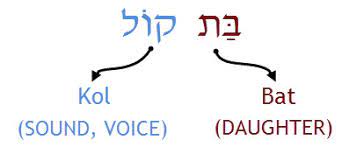
And yet, when we read is text, we can’t help but seeing the fear of the people, who fall back. A midrash says that they fall back at the first letter of the Ten Sayings, which, surprisingly, is Alef, from the word Anochi, I. And why they fall back? Well, according to the Me’or Eynayim (Menachem Nachum of Chernobyl (1730-1797), who also wrote in the 18th century, it is because no one can stay at this high level of consciousness at all times. It is humanly impossible: the feeling of the presence of God ebbs and flows, this connection with the life-force, the root, is felt in waves.
One of the reasons, says the Me’or Eynayim, is that we need to ride the wave, so as to always reach higher next time. In everything, he says, there has to be Absence before Presence being felt. SO to reach a higher level, we first need to experience absence. The absence, of course, is felt but not real – since all the world is filled with God’s glory, kol haaretz maleh kevodo, as we say in the Kedushah.
But there is also another reason, says the Me’or Eynayim – we fall down so we can bring others up with us. When we fall from our level, we have the ability to reach others who are behind in their spiritual development, and so by riding the wave we have the ability to find them and bring them to ride the wave with us, and reach a higher level, previously inexperienced by them.

But all that can only be accomplished if we are aware that we are touching, and feeding, our soul-root, our letter in the Torah, our internal connection with the Transcendent, every time we study Torah. By using our voice we can connect and reconnect with the Voice that spoke the Ten Sayings, the Sound that created the world, the Voice, the Sound, that brought us, specifically, to existence.
May this be a week in which we reach higher and higher levels, and bring others with us, even as we experience the ebb and flow of the Divine Voice within. Shabbat Shalom.
Vaera ~ Plagues then and now
Vaera –
Our portion begins with God revealing that God’s name has changed between the patriarchs and now. The “four expressions of redemption,” are used for the promise of taking the Jews out of Egypt and into the land. The Jews won’t listen, due to smallness of spirit and difficult work, kotzer ruach veavodah kashah.
Moses and Aaron repeatedly come before Pharaoh to demand in the name of G‑d, “Let My people go, so that they may serve Me in the wilderness.” Pharaoh repeatedly refuses. Aaron’s staff turns into a snake and swallows the staffs of the Egyptian sorcerers. The ten plagues begin.
The waters of the Nile turn to blood; swarms of frogs overrun the land; lice infest all men and beasts. Hordes of wild animals invade the cities; a pestilence kills the domestic animals; painful boils afflict the Egyptians, and a devastating hail. This is where the portion stops.
==
~ What is the purpose of the plagues, in your opinion? If God could take the Jews out of Egypt just like that, why didn’t God do so? Can you find in our text explanations for the purpose of the plagues?
~ Is there a progression on the Egyptians understanding of the plagues? Is there a progression on the Jews’ understanding of the plagues? Is there a progression on Pharaoh’s?
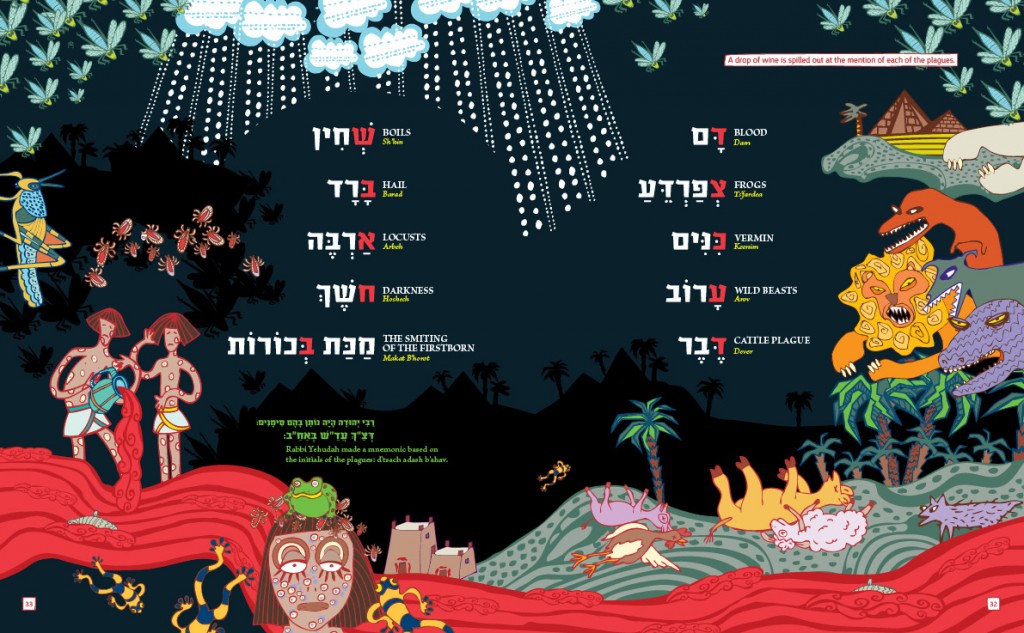
The ten plagues lasted a year, according to Rabbi Akiva. This is learned through a midrash on the last portion we read. According to Ex. 5:12 the plagues began only after the Egyptians forced the Israelite slaves to search for their own straw. Since straw is found in the month of Iyyar, May, and the Israelites left Egypt in Nissan, April, the conclusion can be drawn that the plagues lasted one year.
A year is a long time for plagues. If you just go with the text of the Torah, you will find that all of it happened in two weeks – the first, blood, lasts seven days, the other last one day, a total of 14 days of plagues. But would 14 days be enough to make the internal changes in the Jews, or in the Egyptians themselves, or in Pharaoh?
The plagues have an interesting structure:
Blood, wild animals and hail are all introduced with a WARNING administered in the MORNING, explaining a PURPOSE. Frogs, pestilence and locusts only have a WARNING and we do not read anything bout the time of the warning, and lice, boils and darkness all arrive WITHOUT WARNING. When you look at this structure alone, you see that at every three plagues you have a warning in the morning with an explanation. The explanations will deepen as the plagues happen:
Blood – “by this you shall know that I am Ad-nai”
Wild animals – “…that you might know that I am Ad-nai in the midst of the land.”
Hail – “that you will know that there is none like Me in all the land.”
It is because of this structure that the traditional haggadot will bring the separation of the ten plagues into three groups:
“Rabbi Yehuda was accustomed to giving [the plagues] mnemonics: Detsakh [the Hebrew initials of the first three plagues, blood, frogs, lice], Adash [wild animals, pestilence and boils], Beachav [hail, locusts, darkness, firstborn].”
Another point I’d like to make is the progression among the Egyptians. First, the magicians themselves say to Pharaoh – this is the finger of God – in the plague of lice. So at the end of the first grouping, the magicians can’t reproduce lice, and have to admit their lack of power. At the plague of boils even the magicians can’t appear near Pharaoh – their lack of power is such that they can’t defend themselves.
And this progression is also found among the Jews. There is no distinction between the Jews and the Egyptians in the first three plagues. Look at the text carefully, and you will see that the distinction only happens on the fourth plague – wild animals. Ibn Ezra is the one that brings this unpopular opinion. The force unleashed in the first three is less precise than the rest, but the ability to control power also has to do with space and time. So as the plagues progress, the distinctions become sharper and more pronounced. The first series of plagues strikes Egypt and Israel without impunity, while the second and third series strike only Egypt. The timing begins to be more precise as well, the first three plagues do not come by appointment, but Pharaoh is told that wild beasts will arrive ‘tomorrow’, that pestilence will occur at a ‘fixed time tomorrow’, and that hail will begin to fall at ‘this very time tomorrow.’
Once you see this pattern, that you can understand why in the plague of hail, there is some break among the Egyptians in the belief in Pharaoh’s power, since we read that “Those among Pharaoh’s courtiers who feared the Ad-nai’s word brought their slaves and livestock indoors to safety.”
Whether our fourth plague is wild beasts or swarms of insects, Goshen – and the Jews – are spared. That is when both Jews and Egyptians get a notice that this is about the Israelite slaves. The same happens in the fifth plague, pestilence, as we read – and of course the Egyptians had to notice, the lack of cattle dying is going to be obvious. Boils, which made a distinction between the two peoples, brought that point even further. So of course you had to be living under a rock not to bring your own slaves and what’s left of your livestock in. But I want us to notice that even at this point we do not read the Egyptians telling Pharaoh to let the people go. And whereas God and Moshe say that, we do not hear a peep from the Israelites themselves either.
It really looks like everyone is just looking out for themselves. But the idea of a collective action, a protest against Pharaoh’s mishandling of the situation is not remotely in anyone’s mind.
Our portion ends with Pharaoh almost relenting, but not really. And the question again is why. Also, if freedom is just the reason for the plagues, why not scoop up the Jews and land them on Mount Sinai?
And one possible answer I want us to entertain today is the creation of a collective identity. One that goes beyond the self. The ability to care for what happens with other segments of society, or of a group. Pharaoh’s permission would not make the Israelites truly free, and truly a people. Same with simply plopping them down at Mount Sinai. The process is important if changes will last. And this ability to care for beyond yourself is truly growth, and truly what brings about meaning in our lives.
I don’t think I need to remind people here who Victor Frankl is. In his “Man in Search of Meaning” he states that his own experience of surviving Auschwitz had to do with his focus on the other, on other inmates, on other realities, on the future he wanted to build after this was over.
Frankl also concludes that there are only two races of people, decent and indecent. No society is free of either of them, and so he tells us of “decent” Nazi guards and “indecent” prisoners, most notably the kapo who would torture and abuse their fellow prisoners for personal gain – we can call this the extreme of the individualistic person. That is the real plague of nowadays.
And so the process of becoming a decent person passes through the stage of being solely worried about oneself, and one’s possessions, as we see in the plague of hail. And we know that it will take a long time and a long process to take the Egypt out of the Jew, and to make us a nation that worries not only about our individuality, but about others – in our group and in other groups – as well. And the change is never complete, we are always struggling between our selfishness and our altruism, and so we must remember coming out of Egypt every day.
